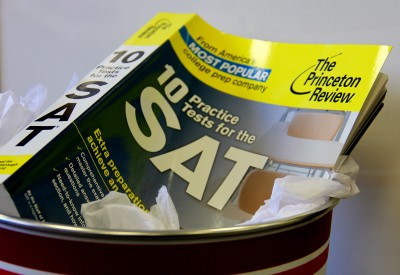
Most undergraduate institutions in the United States are using more comprehensive tools for assessment to evaluate students’ skills instead of traditional standardized tests, according to the Trends in Learning Outcome Assessment survey published Wednesday.
The online survey, conducted from July 15 to Oct. 13, 2015 by the Association of American Colleges and Universities, aimed to define common learning outcomes across higher education institutions. All 1,001 AAC&U member institutions, including Boston University, were invited to complete the survey, according to the report.
A valuable takeaway from the survey is the ongoing trend of universities departing from standardized tests and adopting other assessment models to gauge students’ skills learned during their undergraduate education, said AAC&U spokesperson Carrie Johnson.
“The biggest implication we find is the focus on more assessment models like rubrics to assess students’ abilities and skills like critical thinking, problem solving and communication,” Johnson said. “The assessments would be more in tune with determining the skills that students need to enter the global economy.”
Forty-two percent of the higher institution members are using the AAC&U’s Valid Assessment of Learning in Undergraduate Education rubrics to assess students’ outcomes in general education, while 58 percent of those who use institutionally created rubrics reported to have been informed by the AAC&U’s VALUE rubric, the report stated.
Johnson said the report shows a significant shift toward “more rubric and less testing” if compared to the institution’s 2009 survey. Seventy-two percent of the member institutions’ chief academic officers were using learning outcomes in 2009, compared to 87 percent in the 2015.
The survey also demonstrated that institutions have a common understanding of what skills are necessary for undergraduates to succeed in the professional world, with writing being the most important one, Johnson said.
“Generally, all employers in our previous surveys and our chief academic officers said students need to be able to write and communicate well in order to enter the competitive global economy,” Johnson said. “It essentially shows an across-the-board consensus that writing is a very key skill.”
Other important skills students should achieve through higher education include critical thinking and analytic reasoning, quantitative reasoning, oral communication and intercultural skills, the survey shows.
BU School of Education Dean Hardin Coleman agreed that standardized tests are not as effective as other assessment models in measuring students’ intelligence.
“High school GPA is a more accurate predictor of college performance than is SAT or ACT,” Coleman wrote in an email. “Small private [institutions are] already using a multiple indicator approach. BU does as well, by looking at the rigor of high school curriculum, extracurricular activities and commitment to non-academic endeavors.”
While several BU students said standardized tests can’t fully represent a student’s ability, they argued about what skillsets are important for today’s college graduates.
Courtney Breiner, a freshman in the College of Arts and Sciences, said the ability to be a good writer serves a holistic objective.
“Theoretically, people don’t need to be good writers, because it depends [on] what profession you’re going into,” Breiner said. “The writing component is important, but it’s very subjective.”
Lauren Vanvalkenburg, a sophomore in CAS, said skills like writing are important no matter what major the students pursue, and the university should use group projects and hands-on learning opportunities to test students on writing skills.
“I’m a math major and I don’t write ever,” Vanvalkenburg said, “but it’s good to get a more rounded background.”
Blaise Ormond, a senior in the College of Communication, said standardized tests like the ACT and SAT do not test the knowledge needed for a professional environment. Ormond added that standardized tests don’t adequately test the skills necessary to enter the global economy, like writing and quantitative reasoning.
“I’m not really sure what other exams or what other ways they could implement these skills, but I definitely don’t think standardized testing is the way to go,” Ormond said. “Knowing how to write and quantitative reasoning is just what you need to know when you go into the real world.”














